3 - Character/circumstance/community
Published online by Cambridge University Press: 24 August 2009
Summary
Why narrative? Why attend to the narrative function, to the telling of stories? Why insist that Christian convictions are best conveyed in story, rather than in proposition and maxim? One answer would be to say that narrative is basic in human life, beyond culture and rooted in nature. Stephen Crites has offered such an account, a narrativist phenomenology in which human consciousness arises out of the narrative depths, the deep ‘unutterable cadences’ of ‘sacred stories’. People ‘awaken to a sacred story, and their most significant mundane stories are told in the effort, never fully successful, to articulate it.’
For the sacred story does not transpire within a conscious world. It forms the very consciousness that projects a total world horizon, and therefore informs the intentions by which actions are projected into that world. The style of these actions dances to its music. … every sacred story is creation story … the story itself creates a world of consciousness and the self that is oriented to it.
Crites's sacred stories are like the consuming text of the Bible – ‘people live in them’ – but they precede all actual texts and narratives – ‘even the myths and epics, even the Scriptures, are mundane stories’ – they precede consciousness itself. Human consciousness mediates between sacred and mundane stories and ‘is itself an incipient story’. The ‘form’ of consciousness, which allows for ‘coherent experience’, is in a ‘rudimentary sense narrative’. Crites argues that memory is ingredient in the form of human consciousness, allowing us to escape the ignorance of the present moment and know ourselves in time. ‘Without memory, in fact, experience would have no coherence at all.
- Type
- Chapter
- Information
- Telling God's StoryBible, Church and Narrative Theology, pp. 64 - 104Publisher: Cambridge University PressPrint publication year: 1996



